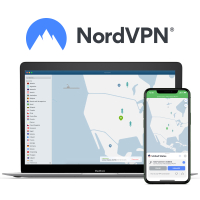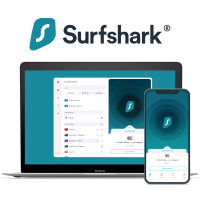Best web browser of 2025
The best web browsers for speed, privacy, and customization

Now that we have to interact with the internet on a day-to-day basis, you shouldn't be hamstrung by your choice of web browser. As your portal to the online world, a bad browser can seriously impact your search results, and therefore your experience.
The best browsers should therefore offer a lightweight and intuitive interface for conducting searches and navigating the web without impacting your device or site performance. As an added bonus, a good web browser should also allow you to customize the types of data you hand over to the websites you visit.
Our experts here at TechRadar Pro have tested many of the biggest and best web browsers - from Chrome to Firefox, Safari and Brave - across a range of criteria such as device and operating system compatibility, performance, search quality, user experience, and customization option to help you find the best browser for your needs.
If security is top of your list when it comes to browsers, why not take a look at our guide to the best anonymous browsers and secure your online presence even further with one of the best VPNs. You can also secure your entire household's online experience with the best parental control apps.
We've also listed the best people search finder sites.
1. The best VPN service overall: NordVPN:
NordVPN has been a leader in the VPN market for over 7 years. With user-friendly apps, fast speeds, and a whole wealth of security features, Nord has risen the ranks to lead the way amongst the best VPN services.
Plus, unlike providers such as ExpressVPN, NordVPN is still available for an impressively low price without compromising features or security. Nord is available from $3.09 per month and has a 30-day money-back guarantee so you can trial with confidence.
2. The best VPN for beginners: ExpressVPN
ExpressVPN has continually sat amongst my top VPN recommendations. With a simple-to-use interface, superb security, and impressive unblocking capabilities, ExpressVPN has features to suit every need.
ExpressVPN's $6.67 per month price point is both absolutely worth paying if you're looking for the best simple VPN experience, but it does make the service notably more expensive than competitors such as NordVPN. However, it does come with a no-questions-asked 30-day money-back guarantee so you can try before you buy.
3. The best cheap VPN: Surfshark
If you want to secure your web browser on a budget, take a look at TechRadar's #3 VPN—Surfshark. Surfshark offers a fantastic, premium option that's unbelievably simple to use and has become a TechRadar favorite.
Surfshark offers most of the same features as other top VPN services for less money. From just $2.29 per month, you can access Surfshark plans, or if you want to try Surfshark before committing to a deal, you can use its 30-day money-back guarantee.
The best web browsers of 2025 in full:
Why you can trust TechRadar
Best web browser overall

Specifications
Reasons to buy
Reasons to avoid
Older readers will remember Microsoft as the villains of the Browser Wars that ultimately led to the fall of Netscape and the rise of Firefox, and later on Chrome. But Microsoft is on the side of the angels now and its Edge browser has been rebuilt with Chromium at its heart. It’s Windows’ default browser and there are also versions for iOS, Android, and Mac.
The latest Edge is considerably faster than its predecessor and includes some useful features including Read Aloud, the ability to cast media such as inline videos to Chromecast devices, integrated AI tools including Bing Chat and Image Creator, and a good selection of add-ons such as password managers, ad-blockers, and so on. You can also download web pages as apps which then run as stand-alone applications without having to launch the whole browser. That’s useful for the likes of Google Docs or Twitter.
There are lots of customization options and we particularly liked the Privacy and Services page, which makes potentially confusing settings crystal clear. Elsewhere, the Site Permissions page gives you fine-grained control over what specific sites can do, including everything from pop-ups and ad blocking to MIDI device access and media autoplay.
Edge looks like Chrome and works like Chrome, but we like it more than Chrome: it’s noticeably faster on our Mac and the customization options are superb.
Read our full Microsoft Edge review.
Best web browser for security

Specifications
Reasons to buy
Reasons to avoid
Firefox has long been the Swiss Army Knife of the internet and one of our favorite browsers. It can alert you if your email address is included in a known data breach, it blocks those annoying allow-notifications popups, it blocks “fingerprinting” browser tracking and it brings its picture in picture video mode to the Mac version.
As before it’s endlessly customizable both in terms of its appearance and in the range of extensions and plugins you can use. Last year’s overhaul dramatically improved its performance, which was starting to lag behind the likes of Chrome, and it’s smooth and solid even on fairly modest hardware.
Firefox, one of the best browsers for a long time, is certainly a great choice for any internet user. It comes with a diverse range of features, beats Chrome in terms of privacy, is easy to use, and is also lightning-quick.
Plus, it doesn't ask for too much space either, so you don't have to think twice before installing it. What's more, Firefox also has multiple customization options — whether you want to stick to the default theme or experiment with a thousand other themes, the choice is yours.
Read our full Mozilla Firefox review.
Best web browser for collecting content
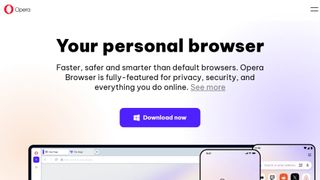
Specifications
Reasons to buy
Reasons to avoid
Opera sets out its stall the moment you first run it: its splash screen enables you to turn on its built-in ad blocker, use its built-in VPN, turn on its Crypto Wallet for cryptocurrency, enable in-browser messaging from the sidebar, and move between light or dark modes.
It’s a great introduction to a really good browser, although if you’re a gamer you should check out Opera GX instead: that’s designed specifically for gamers and features Twitch integration and Razer Chroma support.
Opera is yet another Chromium-based browser, so performance is speedy and you can use add-ons from the Chrome library. It also has some interesting ideas of its own such as My Flow: if you’re constantly emailing or messaging interesting links to yourself, Flow enables you to do that more elegantly by making it easy to share content from Opera on your phone to Opera on your computer.
But that's just the start. Opera's more advanced features include Aria, a powerful OpenAI-powered assistant which makes it easy to explain or summarize complex content, generate ideas and recommendations, translate text, or create new content of your own: emails, blog posts, letters, even poems or songs.
Although some people still see Opera as an also-ran in the browser world, it's improved in leaps and bounds in recent years, and the latest innovations ensure it's a browser to watch both now and in the future.
Read our full Opera browser review.
Best web browser for a mix of everything
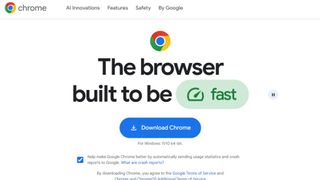
Specifications
Reasons to buy
Reasons to avoid
If imitation is the most sincere form of flattery then Microsoft’s adoption of the Chromium engine for its own Edge browser must be making Google feel pretty good about itself.
But there are some areas in which Microsoft’s contender actually beats the big G, most noticeably in resource usage: Chrome is infamous for its hefty resource demands and it can run really slow on lower-end hardware and RAM (albeit more on Windows than ChromeOS, queue conspiracy theories).
The Memory Saver mode is designed to address that by freeing up resources from tabs you're not currently using, but Chrome remains pretty hardware-hungry.
Chrome is by no means a bad browser. Quite the contrary: it’s a brilliant browser with a superb library of add-ons, cross-platform support and sync, excellent autofill features, and some great tools for web developers.
It can warn you if your email’s been compromised, it has secure DNS lookup for compatible providers (Google’s own Public DNS is one of them) and it blocks lots of dangerous mixed content such as scripts and images on otherwise secure connections.
Perhaps best of all, if you're tired of suspicious websites asking you to 'click every tile containing a bicycle', Chrome now includes new ways to tell sites you're a human, not a bot, hopefully reducing the number of annoying captchas you'll see.
However, all this kind of gets rolled back by the fact that Chrome is owned and operated by Google as a means of collecting data from its users, regardless of what the company says about privacy. Secure it is, private it isn't.
Read our full Google Chrome review.
Best web browser for customization
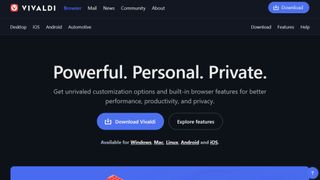
5. Vivaldi
Our expert review:
Specifications
Reasons to buy
Reasons to avoid
Vivaldi is the brainchild of former Opera developers, and like Opera, it does things differently from the big-name browsers. In this case, very differently. Vivaldi is all about customization, and you can tweak pretty much everything from the way navigation works to how the user interface looks.
Chromium is once again under the surface here (which means you can use most Chrome add-ons), but what’s on top is very different from other Chromium-based browsers. You can pin sites to the sidebar, stick toolbars wherever suits and adjust pages’ fonts and color schemes; have a notes panel as well as the usual history and bookmarks bits; customize the way search works and give search engines nicknames; change how tabs work and get grouped and much, much more.
You can even view your history in graph form to see just how much of your time you’ve been spending on particular sites. We particularly like the tab stacks, which are a boon for anyone who tends to end up trying to keep track of dozens of open tabs.
If you’re the kind of person who likes to fiddle with interfaces instead of getting on with stuff, it’s a potential productivity nightmare – but it’s fantastic for power users who know exactly what they want and how they want it to work.
Read our full Vivaldi browser review.
We've featured the best free email clients.
Best web browser FAQs
What is a web browser?
A web browser is a tool that enables users to surf and access websites that are on the internet.
There are plenty of web browsers, but the most popular options are Mozilla Firefox, Google Chrome, Microsoft Edge, Apple Safari, and Opera.
How to choose the best web browsers for you?
Selecting a web browser to use for the long term is a very personal thing, and will depend on your individual browsing security, privacy and accessibility needs. From a technical perspective, it will also depend on what your computer is able to handle in terms of processing speed, and memory capacity.
For example, if privacy is your primary deciding factor in a browser, Firefox or Brave browser will be your best bet. Although if you're used to using Google software and products, opting for Chrome may be a better option.
How we test
We've tested the best web browsers on factors like interface, speed, security, and other accessibility features. We evaluated their customizability, cross-platform support, and system requirements.
We also mentioned if the browsers had additional security features like VPN or proxy.
Read how we test, rate, and review products on TechRadar.
More reviews
Also see our reviews for the following browsers:
- Brave browser review
- Safari browser review
- Tor Browser review
- Avast browser review
- Mullvad browser review
- Maxthon browser review
- DuckDuckGo Private Browser review
- Phoenix browser review
- Aloha browser review
- Opera Mini review
- Firefox Focus review
- Samsung Internet Browser
- UR Browser review
- Epic Browser review
We've also listed the best parental control software.
Get in touch
- Want to find out about commercial or marketing opportunities? Click here
- Out of date info, errors, complaints or broken links? Give us a nudge
- Got a suggestion for a product or service provider? Message us directly
- You've reached the end of the page. Jump back up to the top ^
Are you a pro? Subscribe to our newsletter
Sign up to the TechRadar Pro newsletter to get all the top news, opinion, features and guidance your business needs to succeed!

Benedict has been writing about security issues for over 7 years, first focusing on geopolitics and international relations while at the University of Buckingham. During this time he studied BA Politics with Journalism, for which he received a second-class honours (upper division), then continuing his studies at a postgraduate level, achieving a distinction in MA Security, Intelligence and Diplomacy. Upon joining TechRadar Pro as a Staff Writer, Benedict transitioned his focus towards cybersecurity, exploring state-sponsored threat actors, malware, social engineering, and national security. Benedict is also an expert on B2B security products, including firewalls, antivirus, endpoint security, and password management.
- Carrie Marshall
- Daryl BaxterSoftware & Downloads Writer

How can AI help businesses get more from CRM? We asked Workbooks

Windows 11 vs macOS for business: which side are you on?
